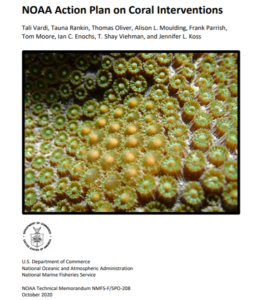
Rapidly deteriorating environmental conditions are threatening coral reefs worldwide, leading to a re-evaluation of long-standing conservation strategies. In response to recommendations from a committee of experts convened by The National Academies of Sciences, Engineering, and Medicine, NOAA has developed an Action Plan on Coral Interventions to guide how the agency will approach coral interventions in the next three years. NCCOS coral research is an integral part of the action plan.
The plan encompasses four actions for NOAA: (1) research and test priority interventions, (2) develop local or regional structured decision support, (3) review policy implications of coral interventions, and (4) invest in infrastructure, research, and coordination.
Coral reefs are threatened by warmer ocean conditions that prevent calcification, impair water quality, and increase the likelihood of disease. Research on interventions to combat these relatively new stressors and a re-evaluation of longstanding interventions are necessary to understand and protect coral reefs in this changing climate.
Some of the interventions that have the potential to enhance recovery and sustainability of corals include stress-hardening, translocation of non-native coral stocks or species, manipulation of coral symbiotic partnerships, managed breeding, genetic modification, and engineering the local environment. While NOAA currently conducts coral research and interventions, implementing sufficient and lasting interventions will require significant additional investment.

